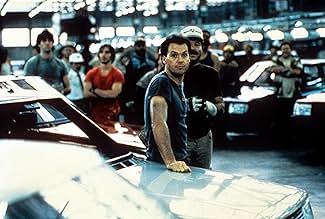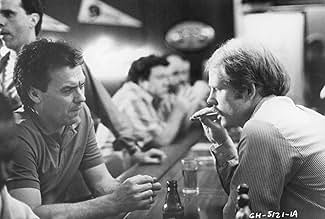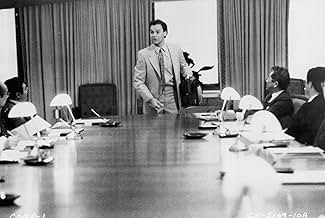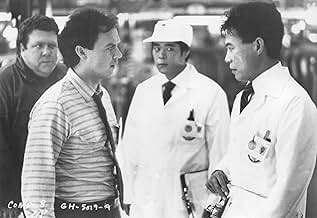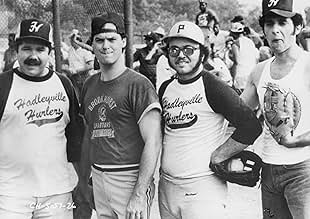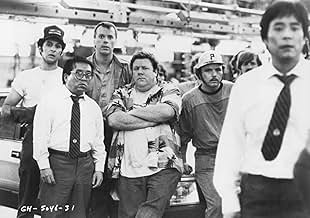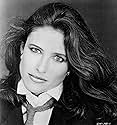Aggiungi una trama nella tua linguaWhen a Japanese automobile company buys an American plant, the American liaison must mediate the clash of work attitudes between the foreign management and native labor.When a Japanese automobile company buys an American plant, the American liaison must mediate the clash of work attitudes between the foreign management and native labor.When a Japanese automobile company buys an American plant, the American liaison must mediate the clash of work attitudes between the foreign management and native labor.
- Regia
- Sceneggiatura
- Star
- Premi
- 1 vittoria in totale
- Mr. Sakamoto
- (as Soh Yamamura)
- Umeki Kazihiro
- (as Patti Yasuiake)
Recensioni in evidenza
Come back with me, children, to a time when Michael Keaton was a straight-up comedy guy, and you might find some joy in this film. It's a gentle comedy -- the kind Ron Howard specializes in -- but if that's your thing, you should check this out. Keaton's low-key charm is just right for this project.
"Gung Ho" is a bit dated, because it takes places in the last stage of the pre-global economy world, when it still mattered what country a business was based in. That said, it delivers laughs as well as a lesson on how people can learn from each other, to great benefit.
You could watch this film and enjoy it without remembering one scene in particular you really liked, but that's because the whole movie provides a slow but constant stream of laughs. It's like an I.V. drip. And I mean that in a good way.
Directed by Ron Howard, the film is about a Japanese car company that decides to buy up a shuttered American car factory in a town where it was the major source of employment. There is friction because of the numerous cultural/work culture differences between the Japanese management and the American workers. The main work problem is that the Japanese think "team" and the American workers on the line are individualists. Michael Keaton stars as Hunt Stevenson, who is promoted to liason between the American workers and the Japanese management. His problem is that he doesn't want to tell the unvarnished truth to the workers, and this gets him into trouble when he tells a lie he just can't take back that could mean the end of the plant. Gedde Watanabe plays the Japanese manager of the plant who is trying to go against his nature of caring about the home life of the workers and be "tough" so that the factory will be considered a success by the CEO back in Japan. Eventually he and Hunt form a friendship of sorts.
George Wendt of "Cheers" fame plays a worker who gets demoted to janitor. John Turturro is practically unrecognizable as another factory worker in a small part before the Coen brothers discovered him. If Ron Howard is directing then Clint Howard is not far away, usually playing a bit part, and that is true here too. Oh, if you are expecting the Michael Keaton of Birdman and Spotlight, then you are in for a surprise. This is the rather smart mouth character Keaton started out playing in the early 80s. Think of Bill Blazejowski of 1982's "Night Shift" (also directed by Ron Howard) but with a much bigger I.Q.
Why is this a time capsule and will probably be hard for you to find? When the American workers get angry they refer to their Japanese bosses with terms such as "rice a roni". Also, when Michael Keaton goes up to see the boss he refers to his Japanese secretary as "sugar puss". He isn't flirting, but that still would never make the grade in an American film today. George Wendt's character gets drunk and basically bullies and harasses the big boss' wife in a supermarket one day. Everybody just writes the episode off as the guy being angry about his demotion, as though that is acceptable behavior! It's just funny to have seen this in the theater back in 1986 and realize how much times have changed.
I'd recommend it as a great look back and as a comedic take on some of the economic issues confronting Americans in the 1980s. That decade was not as prosperous and carefree as you might have been led to believe.
Therefore, before hucking it under the pile, never to be seen again, you might want to look upon it in a most serious light and see if it doesn't share some elements of truth that you've experienced when interfacing with other cultures in your life.
Just a thought.
David I. Brager
But let's face it: the movie isn't funny. Babaloo Mandel and Lowell Ganz are terrific writers ("Splash", "Parenthood") but they didn't create much moments we could say they were funny, most of the time is just using of caricatures to make some amusing moments, they barely work, maybe two or three scenes. Their concentration to the more engaging aspects was what made "Gung Ho" something really worth seeing. It pokes fun on the culture comparisons between U.S., specially when it comes to both nations traditions but it also establishes a greater sense of supporting each other, one might be better than the other but only together they come up with something bigger, better and stronger. Having a movie like this made on a decade where American superiority was presented in every single movie and also in politics is something of a miracle. It basically says: "We're no longer the strongest nation in the world, neither the most efficient but we can aspire to be if we follow some other examples around the world". Sure, it doesn't paint a fair picture for both sides (Japanese as workaholics who can't contest their bosses and Americans as lazy and incompetent), often recurring to stereotypes but presents something good out of those.
Although a little sloppy, clichéd and never serious enough, "Gung Ho" can be used as a source of inspiration, at least for those who have a company and doesn't know how to bring out the best with their employs, it's always there to bring out of the best of a team, push them to the limits and show them the advantages of following new directives. I know this movie is something of a classic between Administration students in here, and most of them enjoy it. Out of this department, it might be a disappointment for Keaton and Ron Howard fans, they're not at their best. The supporting cast formed with the likes of Mimi Rogers, George Wendt, John Turturro, Rance and Clint Howard save this for a bit, but the most interesting in scene is Watanabe, the funniest in the show.
In the end, it reaches its purpose of presenting a parallel between cultures, but never takes our fully enjoyment, neither much of our laughs. Easy to watch and quite motivational though. 7/10
Lo sapevi?
- QuizAccording to Bloomberg Businessweek, Toyota executives later used the movie as an example of how not to manage Americans.
- BlooperWhen Hunt Stevenson meets the Japanese managers for the first time, they hand their business cards over with one hand. Japanese business protocol requires formally presenting business cards, holding them with both hands.
- Citazioni
Hunt Stevenson: If you walk out that door, you're going to miss a great comeback. We're ready to roll here, Jack.
Mr. Sakamoto: This will never be like a Japanese factory... *Jack.*
Hunt Stevenson: Oh, yeah? You're right. You know what else? So what?
Mr. Sakamoto: You failed.
Hunt Stevenson: Really? Wanna know something? I got one of the first cars ever made here. I got *the* first car ever - I don't think I want it anymore. As a matter of fact, here.
[hands keys to Mr. Sakamoto]
Hunt Stevenson: Why don't you take the keys, okay? I'd rather have one of those cars.
[points to cars in assembly line]
Hunt Stevenson: I'd rather have one of these cars that *we* made *together,* by hand. Your guys and my guys, together. You know why? Because those cars stand for something. Those cars stand for something pretty great. I'm proud of those cars. I'm taking one.
[Turns to workers]
Hunt Stevenson: Gentlemen, I'm going home in my new car!
[All workers cheer and applaud, then silently pray that Hunt's new car has a working engine. Hunt starts the car, and the workers cheer. However, the car literally falls apart after about two yards, and the workers start to moan. Hunter gets out of the car]
Hunt Stevenson: I tell ya, I thought it handled great!
- Versioni alternativeSome international editions distributed by Paramount on DVD, reduced the aspect ratio from original 2.39:1 to 2.09:1.
- ConnessioniFeatured in Generation X: The Power of Disruption (2016)
- Colonne sonoreDon't Get Me Wrong
Written by Chrissie Hynde
Performed by The Pretenders
Produced by Jimmy Lavine and Bob Clearmountain
Courtesy of Sire Records Company
I più visti
- How long is Gung Ho?Powered by Alexa
Dettagli
Botteghino
- Budget
- 18.000.000 USD (previsto)
- Lordo Stati Uniti e Canada
- 36.611.610 USD
- Fine settimana di apertura Stati Uniti e Canada
- 7.170.830 USD
- 16 mar 1986
- Lordo in tutto il mondo
- 36.611.610 USD
- Tempo di esecuzione1 ora 52 minuti
- Colore
- Proporzioni
- 2.35 : 1
Contribuisci a questa pagina



